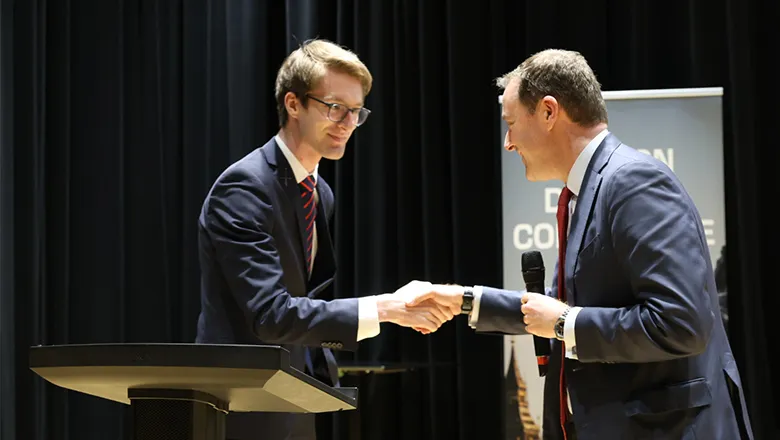To contribute to an audience full of professionals in the field has been a privilege as well as a fantastic opportunity to reflect on my MA at King’s. Overall, this experience has underlined the value in taking initiative even as a young researcher, and I can only encourage the next cohort to participate.
Darius Kölsch
24 May 2024
War Studies MA student wins London Defence Conference competition
Darius Kölsch presented on the ongoing war in Ukraine, which led him to win the "Future of Deterrence" presentation competition at the London Defence Conference 2024.

Titled “Ukraine: The Past, Present, and Future of Deterrence”, Darius’s presentation analysed the ongoing Russia-Ukraine war, examining the failures of past deterrence strategies, as well as current and future challenges.
The competition was sponsored by KBR, a leading UK-based company known for its cutting-edge science, technology, and engineering solutions. Students from UK universities were invited to explore and present their insights on the evolving landscape of deterrence in national security.
Future defence capabilities cannot be delivered without the commitment and expertise of emerging and motivated young leaders. KBR, and our Frazer-Nash business are proud to support the first LDC Student Presentation Competition, and Darius’s winning entry was thoroughly thought-provoking and excellent in concentrating on critical current issue: the use of drones as a decisive capability in the war in Ukraine and what this means for the future of deterrence. With leaders like him, we should all take great hope in the prospects for the future of European security.
Paul Kahn, President of Government Solutions International at KBR.
In his presentation, Darius emphasised the lack of a unified and robust response from Western nations. Echoing the muted reaction to the annexation of Crimea in 2014, which encouraged the Kremlin to pursue further territorial ambitions.
He also highlighted the pivotal role of drones in modern warfare and the need for new strategies of dispersion and concealment. “While Ukraine aims to field around one million drones this year, Western militaries lag in their readiness to match this scale of drone deployment”, he said.
Darius also discussed that the future of deterrence depends on a resolute and sustained Western response to Russian aggression. He argued that a victory for Ukraine, with strong Western support, is crucial for Ukraine’s sovereignty but also for restoring and maintaining global deterrence credibility.
Dr Hillary Briffa, a member of the of the LDC organising committee, highlights the competition as an opportunity for fostering fresh thinking within the defence community.
By engaging students from diverse academic backgrounds, we tap into a reservoir of innovative ideas and perspectives that can challenge conventional wisdom and drive forward our understanding of national security issues. This year's winner exemplifies the creativity and analytical rigour that young minds bring to the table. Darius Koelsch's insightful approach highlights the importance of integrating new voices into our strategic conversations, ensuring that our defence strategies remain responsive to evolving global threats.
Dr Hillary Briffa
London Defence Conference is an annual geopolitical conference that brings together influential figures from politics, defence, industry, media, and think-tanks to discuss and present national security issues.
More information at londondefenceconference.com


